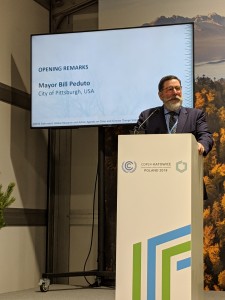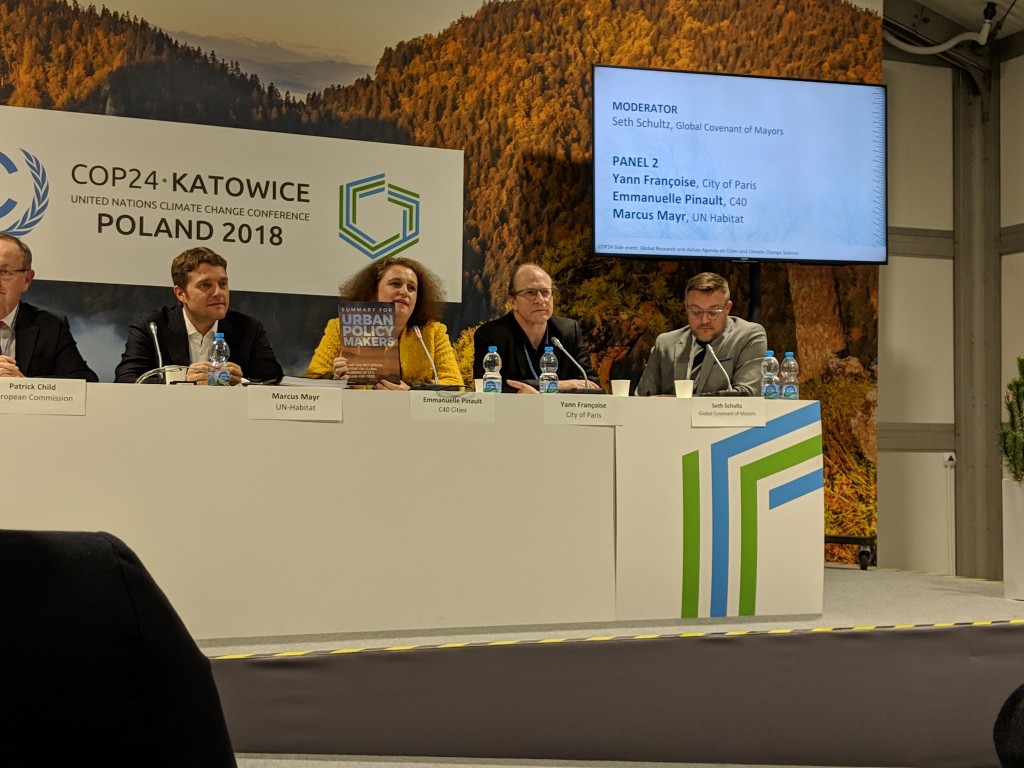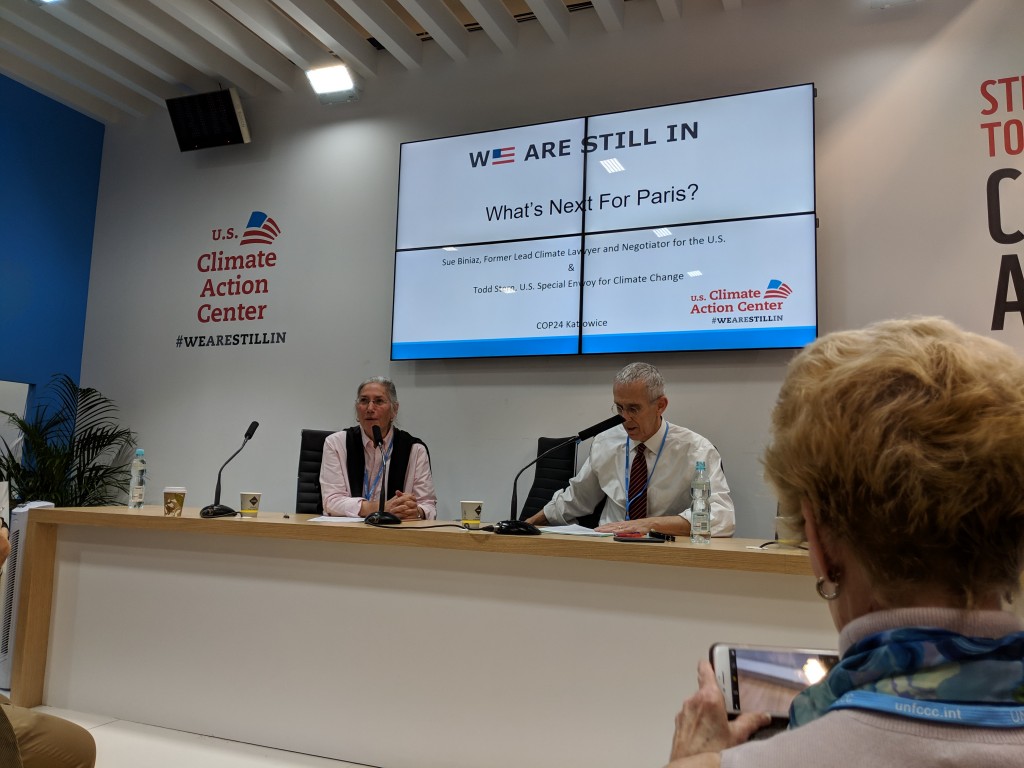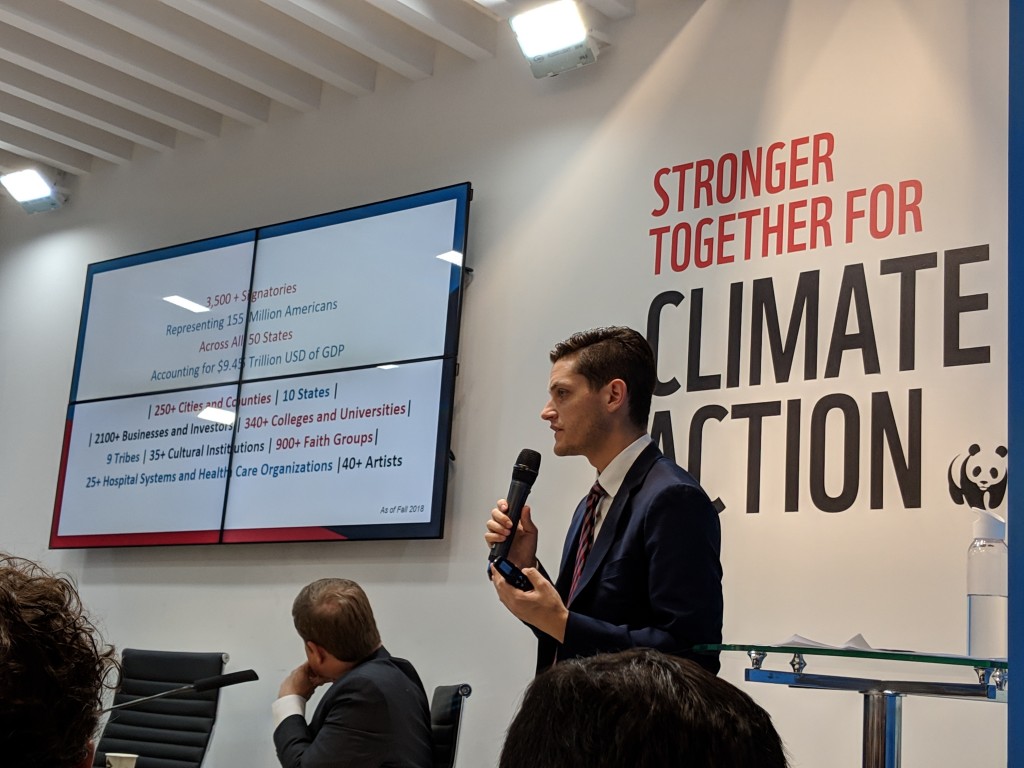I study urban governance of climate change, so while at the COP I am focused on conversations regarding ‘sub-national’ and/or ‘non-state’ actors (to use common UNFCCC language), and in particular conversations regarding cities.
To some extent, city-level discussions are out of place at a UN conference, which hosts negotiations among federal government representatives. However, when it comes to addressing climate change, national-level negotiations may not be the most effective. Or rather, it would be “insufficient” – as one speaker said today – “to have a theory of change that relies exclusively on national governments.”
As of this year, the UN published data that over 55% of the global population now lives in urban areas, and this number is expected to still grow significantly over this century. One social scientist describes the modern age as blanketed in an “urban fabric”, such that all regions – cities or rural – are influenced by a globalized, urban-centric culture. A majority of the planet’s people, built infrastructure, and economic assets are based in cities. So cities are generally important to the modern world. But for all of the above reasons their involvement is also essential to achieving the goal of limiting planetary warming to 1.5C.
This fact is strongly recognized in side events at this year’s COP, though it seems to me it hasn’t quite reached the high-level negotiations. In these past two days, I have heard local representatives from many countries talk about successes in their cities, and how these changes are essential in order for their countries to meet their Nationally Determined Contributions (NDCs) as committed to in the Paris Agreement.
There are other exciting developments in the works. The IPCC recognized a need for more research and data on cities, and so held the first CitiesIPCC conference in Canada this past March. Additionally, some of the scientists who wrote the IPCC Special Report on 1.5C also released (at a session yesterday! See picture below) a summary of the special report specifically written for urban policymakers.
Finally, novel networks have been developing within countries, such as: #WeAreStillIn in the US (which both Swarthmore College and Swarthmore Borough are signatories of), the Japan Climate Initiative, and Alianza para la Acción Climática in Argentina. I also learned today that there is a fairly new network of these networks, called the Alliances for Climate Action.
It will be a fascinating political science and climate policy-making question in the years to come as to how to incorporate such non-state actors (which include not just cities, but also businesses, higher ed, civil society, etc.) into international climate negotiations. There needs to be a place for them at the table, and this has the potential to shake up the standard practice of state-focused negotiations. As another speaker said today, it will only be via “constructive engagement” between state and non-state actors that we will be able to sufficiently “accelerate NDC implementation.”




That’s so exciting that the IPCC released a summary document for urban city policy makers! I think that’s a clear example of how higher level organizations can advocate for change on more regional scales, but with just as large of an impact. I imagine it’s hard for delegates of countries to even consider city level change in relation to the Paris agreement, but I think it’s interesting to consider how changing their scope may actually offer more solutions.
Super interesting! In Bonn the US Climate Action Center felt like a real novelty in terms of sub-national participation. Has there been an increase in participation by these types of groups from outside the US this year as well?
Thanks, Brittni & Jennifer. Yes, it really does seem to be an increase this year. While I haven’t been at COP before, the speakers have been suggesting that this year is novel (for example, the IPCC report for urban policymakers that was released this Monday and the new international Alliances for Climate Action – more details above). I’ve also attended events focused on urban governance in East Asia and Africa. In a similar vein, YOUNGO has just formed a new Cities working group to start to partner with these new initiatives. I’ve joined the group, so I’m excited to see what comes next!
Still, there is a disconnect between what the speakers in these side events are saying and, as far as I can tell, how official negotiators talk about the role of cities at a higher level of discussion. Although there does seem to be increasing commentary about how to better involve ‘non-state’ actors in the future.
One other thought: I heard from some Brazilians that they are wondering if their country will copy the US model of an unofficial, non-state pavilion given that Bolsonaro is unlikely to send an official delegation next year.
I think smart urban planning is vital to all paths forward, thanks for the heads up that there is a specific IPCC summary that targets this important aspect!